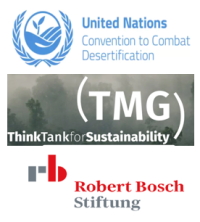

News in 2023
|
 |
Clarissa Augustinus, FIG Ambassador and Co-Chair of FIG Task Force on Climate Compass, represented FIG by at a meeting organized by UNCCD, TMG and the Bosch Foundation, which took place in Berlin, Germany from the 3-5 July, 2023. It was a strategy workshop focused on Women’s Land Rights and the 3 Rio Conventions. A wide range of organizations were represented including governments, United Nations and not for profit organizations. United Nations representatives included the United Nations Convention to Combat Desertification (UNCCD), the United Nations Convention on Biological Diversity (CBD, and the most well-known of all the 3 Rio Conventions, the United Nations Framework Convention on Climate Change (UNFCCC, also known as UN Climate Change). |
The UN Environment Programme (UNEP), UN-Women, the UN Food and Agricultural Organization (FAO), UN-Habitat/Global Land Tool Network and the UN High Commissioner for Human Rights, as well as CIFOR-ICRAF were also present. FIG has partnered with some of these organizations before, but many of the environmental organizations were new, including the not-for-profit environmental organizations. Not for profit land organizations at the meeting with which FIG has partnered included Landesa, Huariou Commission, Land Portal and the International Land Coalition.
The objectives of the workshop were to (1) build synergy across the 3 Rio Conventions on climate, biodiversity and desertification regarding land and particularly women’s land rights at national and international levels (2) build a shared understanding of the financial and operational aspects that need to be addressed to embed women’s land rights and grassroots and civil society initiatives, in country level climate, restoration and biomass-related carbon recovery (e.g. reforestation) projects.
All the governments linked to the 3 Conventions, known as the Conference of Parties or COPS, have committed to engage in more gender-responsive designs and implementation of measures to achieve their respective goals.
 |
Regarding the CBD, the Kunming-Montreal Global Biodiversity Framework, agreed in 2022, set 3 gender related targets. Target 3 which focuses on equitable governance, indigenous people and local communities. |
Target 22 which focuses on representation in decision making, land rights, women and gender-responsive. Target 23 which is about gender equality, land access, decision making, land rights and women’s leadership. At the same time CBD parties, or governments, also agreed to set up a Gender Plan of Action with the objective of increasing all women and girls’ rights to ownership and control over land and access to natural resources and to water, to support the conservation and sustainable use of biodiversity.
|
|
The Parties or governments linked to UNCCD at its COP14 in 2019 made a landmark decision to link land tenure to its work on land degradation. |
Decision 26 linked work done on tenure through the Voluntary Guidelines on the Responsible Governance of Tenure of Land, Fisheries and Forests in the Context of National Food Security to UNCCD’s work on land degradation, drought and desertification. It recognized that land governance is a fundamental component of sustainable land management. UNCCD’s COP15 in 2022 expanded this and Decisions 3,22,27 promote gender-responsive approaches for land restoration and land degradation neutrality interventions. A Gender Action Plan was also set up.
 |
The Climate Convention’s (UNFCCC) COP 23 in 2017 adopted a Gender Action Plan. A number of Decisions about gender were made at COPs 24,25,26 and 27, with an Intermediate Review of the Implementation of the Gender Action Plan being agreed at COP27 in 2022. None of these Decisions include a reference to land. |
The Berlin workshop participants recognized that land rights, including women’s land rights, are vital for the design of sustainable development and for all 3 Rio Conventions to achieve their goals. Women, particularly women in local communities, need to be part of the assessment, (co-)design, implementation and monitoring of projects, to ensure the achievement and maintenance of these goals. Just as there is work on “A just transition for energy.’ There also needs to be ‘A just transition for land’, and women and vulnerable groups are central to such a just transition.
At the workshop FIG was asked to facilitate the world café and break away sessions to identify implementation approaches to link (sub-) national land rights and climate, restoration and biomass-related carbon recovery in projects. This was one of the 5 main focus areas of the workshop. A report will be produced by the organizers of the meeting outlining the findings from the different working groups.
At the closing session FIG indicated that it was open to partnerships
and was looking for capacity development opportunities for its members
on the issues being discussed. FIG also invited meeting participants to
attend the upcoming
Climate Compass Task Force webinars.
Clarissa Augustinus
July 2023